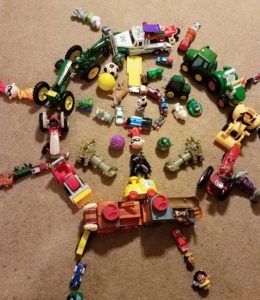One evening this week, I found the living room floor covered with toys. It was late, I had been at work all day, and I was exhausted. Briefly I considered telling the boys to pick up the toys, but I was too tired to care. So, I planned to do some general clean up in the morning.

A messy floor or a form of art?
I tucked my three year old into bed, and, when I returned, I found my 7 and 10 year old huddled around a pile of toys. They were exuberantly moving them around to make patterns on the floor. “Come here, Mom; look what we made.” I came closer and looked. “Cool, that’s very creative,” I praised. “What is it that you’re trying to make?”
My seven year old responded sagely, “Art, Mom. Art can be made of anything, you know.”
Now, if the situation had been slightly altered, say, we had guests coming over or the boys had already tried my patience throughout the day, then my response to their creativity would certainly have been different. I would not have stopped to notice what they were doing before I commanded them to put up all of the toys and clean up their mess.
A similar scenario happened earlier in the week. I have one child that learns through hands-on experience. Although in some ways this makes him incredibly creative and an out-of-the box thinker, it also means he often makes messes and is impulsive.
One evening we had guests for dinner, and plastic cups were left on the counter overnight. The next morning, I sat down to start homeschool with the boys, and they were all gathered around the counter in the kitchen. I came over to find that this child had taken two cups, stacked on top of one another, and had poked a hole with a toothpick in the bottom of the top cup. He had filled the cup with water, and it had begun shooting water like a fountain. He even had the foresight to put a cup and pan underneath it to catch the excess water.
Again, my first reflex was to tell him to clean it up and yell at him for making a mess when it was time to start homeschool. Instead, I admired his invention, telling him it was really creative, because honestly, it really was. I would never have thought to do that.
Much more frequently than I like, I find myself stifling my children’s creativity, telling them to wait when they have something important to tell me, and barking commands while trying to maintain some kind of order and control. It makes me wonder how many times I have missed little sparks of joy and creativity because of my own grown-up agenda.
Proverbs 14:29 says:
A patient person shows great understanding, but a quick-tempered one promotes foolishness.

Proverbs 14:29 HCSB
Patience is not my strong suit, and I have had plenty of “quick-tempered” moments with my children. Those moments usually result in bad attitudes all around. However, when I am not rushed and when I have time to observe and listen to my children, I do find myself understanding their motivations. I am better able to appreciate their ideas and their exuberance for inventing and creating.
Pause: Are you feeling tense or stressed today? Stretching can relieve some muscle tension. If it is comfortable for you, stand up and reach your hands towards the ceiling, stretching out your back muscles. Take a moment to stretch any other muscles that are feeling tense.
Renew: Now, read over the Proverb above. Think about a time that you were patient, and it produced understanding in your life. What is it that you better understood?
Next: Think about a relationship or a situation in your life in which you find it difficult to be patient. In fact, you might even find yourself feeling “quick-tempered.” Pray, think, and journal about ways that you can work towards more patience in this area. Then, put one of your ideas into practice. Observe whether you gain any new “understanding” in this relationship or situation as you practice patience.
May you (and I) be quick to listen, slow to speak, and slow to anger today.
Pause, Renew, Next!
